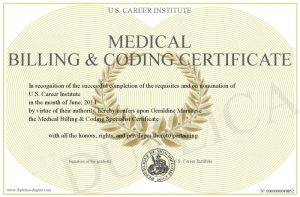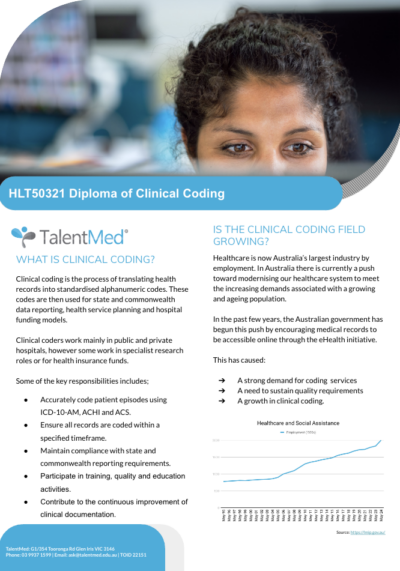If you have ever wondered about pursuing a career in healthcare that combines analytical skills with attention to detail, becoming a clinical coder might be the ideal path for you. Clinical coders play a crucial role in accurately translating medical diagnoses and procedures into a coded format. In this article, explore the steps and requirements to embark on this rewarding profession, as well as the skills and knowledge necessary to excel in the field of clinical coding. Discover the diverse opportunities available and the potential for professional growth in this challenging yet essential healthcare role.
Education and Training

High School Education
To become a clinical coder, a solid foundation in education is essential. It starts with completing high school, where you should focus on subjects such as biology, chemistry, mathematics, and computer science. These subjects lay the groundwork for the knowledge and skills needed for the field of clinical coding. A strong academic performance during high school will give you a competitive edge when pursuing further education and training in this field.
Undergraduate Degree
While not always mandatory, obtaining an undergraduate degree can significantly enhance your chances of becoming a successful clinical coder. Pursuing a degree in health information management, medical coding, or a related field will provide you with a deep understanding of medical terminology, coding systems, and healthcare administration. A comprehensive undergraduate program will also cover courses in anatomy, physiology, data management, and computer information systems, further preparing you for a career as a clinical coder.
Clinical Coding Courses
After completing your undergraduate degree, it is essential to undertake specialized clinical coding courses. These courses focus specifically on medical coding practices, coding guidelines, and the use of industry-standard coding systems, such as the International Classification of Diseases (ICD) and the Current Procedural Terminology (CPT). These courses will equip you with the necessary skills to accurately assign codes to medical diagnoses, procedures, and services based on clinical documentation.
Certification Programs
To demonstrate your expertise and enhance your job prospects, pursuing certification in clinical coding is highly recommended. There are several organizations that offer certification programs, most notably the American Health Information Management Association (AHIMA) and the American Academy of Professional Coders (AAPC). These certification programs typically require passing a rigorous exam to assess your coding knowledge and skills. By becoming certified, you will showcase your commitment to excellence and increase your chances of securing desirable employment opportunities in the healthcare industry.
Required Skills and Qualities

Attention to Detail
As a clinical coder, attention to detail is paramount. The role involves reviewing complex medical records and translating them into accurate codes. A single error in coding can have a significant impact on patient care, billing, and healthcare analytics. By developing a keen eye for detail, you will ensure the codes accurately reflect the medical documentation, enabling healthcare providers to deliver appropriate and effective care.
Analytical Thinking
Analytical thinking is another key skill for clinical coders. The ability to analyze medical records, determine the appropriate codes based on established guidelines, and identify any inconsistencies or missing information is essential. Moreover, clinical coders are often required to interpret complex medical procedures and diagnoses and translate them into coding language. Strong analytical skills will enable you to make informed decisions and ensure the accuracy and integrity of coded data.
Medical Terminology
Proficiency in medical terminology is fundamental to becoming a successful clinical coder. Understanding medical jargon, abbreviations, and the anatomical and physiological aspects of diseases and procedures is crucial for accurate coding. As a clinical coder, you will need to familiarize yourself with terms related to various specialties, such as cardiology, dermatology, or orthopedics. A solid foundation in medical terminology will facilitate your coding accuracy and efficiency.
Coding Systems Knowledge
a comprehensive knowledge of coding systems is a must for clinical coders. The most widely used coding systems in healthcare are the International Classification of Diseases (ICD) and the Current Procedural Terminology (CPT). Mastery of these systems is essential for correctly assigning diagnostic and procedural codes. Additionally, familiarity with other coding systems, such as Healthcare Common Procedure Coding System (HCPCS), will further expand your coding capabilities and make you a valuable asset to your employer.
Computer Skills
Clinical coding is a highly computerized field. Proficiency in computer skills is therefore essential for clinical coders. You will use specialized software and electronic health record systems (EHRs) to access patient records, assign codes, and generate reports. Moreover, you should be comfortable working with spreadsheets and databases, as this field involves managing and analyzing large volumes of data. Strong computer skills will enable you to work efficiently and stay up-to-date with the latest coding technologies.
Gaining Experience

This image is property of d3njjcbhbojbot.cloudfront.net.
Internships
Gaining practical experience through internships can be highly beneficial in your journey to becoming a clinical coder. Internships provide you with hands-on exposure to the healthcare environment, allowing you to apply your theoretical knowledge in a real-world setting. It is an opportunity to work closely with experienced coding professionals, learn from their expertise, and refine your coding skills. Internships can also serve as a gateway to potential job opportunities, as they often provide a foot in the door to the industry.
Volunteering
Volunteering at healthcare facilities, such as hospitals or clinics, can also provide valuable experience and networking opportunities. While volunteering may not directly involve coding tasks, it allows you to observe coding processes, interact with healthcare professionals, and gain insights into the healthcare industry. By dedicating your time and skills, you demonstrate your commitment to the field and build your professional network, potentially opening doors to future coding positions.
Entry-Level Positions
Securing entry-level positions in healthcare settings, such as medical coding clerk or coding assistant, can provide you with practical experience and further develop your coding skills. These positions often involve assisting experienced coders, reviewing medical records, and performing coding tasks under supervision. By immersing yourself in a coding environment, you will gain familiarity with coding procedures, coding software, and coding audits. Entry-level positions also provide an opportunity for continuous learning and growth as you work towards more advanced coding roles.
Getting Certified

Certification Importance
Obtaining certification in clinical coding is highly regarded within the healthcare industry. It demonstrates your proficiency and dedication to maintaining high coding standards. Many healthcare organizations and employers prioritize certified coders when hiring, as certifications validate your knowledge, skills, and adherence to coding guidelines. Certification enhances your credibility, expands your job prospects, and increases your earning potential as a clinical coder.
AHIMA Certification
The American Health Information Management Association (AHIMA) offers two primary certifications in clinical coding: the Certified Coding Associate (CCA) and the Certified Coding Specialist (CCS) credentials. The CCA certification is suitable for entry-level coding positions, while the CCS certification is geared towards more experienced coders. AHIMA certifications require passing a comprehensive exam that assesses your knowledge of medical coding guidelines, coding systems, and healthcare regulations.
AAPC Certification
The American Academy of Professional Coders (AAPC) also offers a range of certifications for clinical coders, including the Certified Professional Coder (CPC) and the Certified Outpatient Coder (COC) credentials. The CPC certification is widely recognized and is suitable for coders working in outpatient settings, such as physician offices or ambulatory surgery centers. The COC certification, on the other hand, focuses specifically on outpatient facility coding. AAPC certifications require passing a rigorous exam that tests your coding knowledge, industry guidelines, and proper use of coding systems.
Exam Preparation
Preparing for certification exams requires dedication and extensive study. There are numerous resources available, such as textbooks, online courses, and practice exams, that can help you prepare effectively. It is recommended to thoroughly review coding guidelines, brush up on medical terminology, and practice assigning codes to case studies. Additionally, attending exam preparation workshops or joining study groups can provide valuable insights and support from fellow coders. Adequate exam preparation will boost your confidence and increase your chances of passing the certification exam on your first attempt.
Continuing Education and Professional Development

This image is property of www.stepintothenhs.nhs.uk.
Continuing Education Units (CEUs)
Continuing education is crucial for clinical coders to stay updated with evolving coding practices, regulatory changes, and advancements in the healthcare industry. Many certifying organizations require coders to earn a certain number of Continuing Education Units (CEUs) to maintain their certification. CEUs can be obtained through various means, such as attending workshops, webinars, conferences, or completing online courses. By regularly participating in continuing education, you demonstrate your commitment to continuous learning and professional growth, ensuring you remain a competent and sought-after clinical coder.
Specialization and Advanced Certifications
As you gain experience and expertise in clinical coding, you may choose to specialize in specific areas of healthcare. Specialization can open up new opportunities and increase your marketability. Examples of specialized coding fields include cardiology, oncology, orthopedics, and pediatrics. Obtaining advanced certifications in these specialties, such as AHIMA’s Certified Coding Specialist-Physician-Based (CCS-P) credential or AAPC’s Certified Professional Medical Auditor (CPMA) certification, will further validate your knowledge and skills in your chosen specialization.
Workshops and Conferences
Attending workshops and conferences related to clinical coding provides valuable networking opportunities and allows you to stay abreast of industry trends and best practices. These events often feature expert speakers who share their insights and knowledge, helping you stay current in your coding profession. Workshops may focus on specific coding topics or provide hands-on coding practice, while conferences offer a broader perspective on healthcare industry developments. Participating in such events nurtures personal and professional growth, expands your network, and exposes you to new ideas and perspectives.
Job Search Strategies

Resume and Cover Letter
When searching for a clinical coding position, a well-crafted resume and cover letter are essential tools for showcasing your skills and qualifications. Tailor your resume to highlight your relevant education, certifications, and experience in medical coding. Include specific examples of your coding prowess, such as your accuracy rate and the coding systems you are proficient in. In your cover letter, emphasize your passion for accurate coding, attention to detail, and your ability to contribute effectively within a healthcare team. A polished and professional resume and cover letter will make you stand out among other candidates.
Networking
Networking is a powerful tool for job seekers, and it holds true for clinical coders as well. Attend professional events, join coding associations, and connect with peers and established coders in the field. Networking can open doors to hidden job opportunities, provide mentorship, and offer insights into the industry. Building relationships with professionals in healthcare administration, revenue cycle management, and other related fields can also expand your career possibilities beyond coding. Remember to maintain a professional online presence on platforms such as LinkedIn to enhance your networking efforts.
Online Job Boards
Online job boards specifically catering to healthcare and coding professions can be valuable resources for job seekers. These platforms often feature a wide range of coding positions, from entry-level to advanced roles. Regularly search and apply for relevant coding positions on reputable job boards, and make sure your resume and online profile are up to date. It is also recommended to explore industry-specific job boards and coding forums, as they may contain job opportunities that are not available on general job boards.
Professional Associations
Joining professional coding associations, such as AHIMA or AAPC, can provide numerous benefits for your job search. These associations often have job boards exclusively for members, offer career resources, and provide networking opportunities. Additionally, membership in professional associations demonstrates your commitment to the profession, enhances your professional credibility, and gives you access to industry news and updates. Participating actively in association activities, such as volunteering for committees or attending local chapter meetings, can also increase your visibility within the coding community.
Interview Preparation

This image is property of www.northwestcareercollege.edu.
Research the Company and Role
Before any interview, it is crucial to thoroughly research the prospective employer and the specific role you are applying for. Familiarize yourself with the organization’s mission, values, and services. Understand their coding processes, coding systems they use, and any coding-related initiatives they may have. This knowledge will allow you to tailor your interview responses to the organization’s specific needs and demonstrate your genuine interest in the position.
Prepare for Competency-based Questions
Many interviewers use competency-based or behavioral questions to assess candidates’ skills and experiences. Prepare for these types of questions by reflecting on your previous coding experiences and identifying specific examples that demonstrate your expertise. Practice answering questions that relate to attention to detail, analytical thinking, decision-making, and teamwork. Providing concrete examples of successful coding projects or challenges you have overcome will illustrate your competency and strengthen your chances of securing the position.
Highlight Relevant Experience
During the interview, make sure to highlight any relevant experience you have gained through internships, volunteering, or entry-level positions. Discuss how these experiences have prepared you for the challenges of clinical coding and emphasize any notable achievements or skills developed during these opportunities. By showcasing your hands-on experience and expertise, you will differentiate yourself from other candidates and demonstrate your readiness to contribute to the organization.
Ask Intelligent Questions
At the end of the interview, when given the opportunity, ask intelligent questions that demonstrate your knowledge of the industry and your commitment to the field. Inquire about the organization’s coding team, their training and development programs, mentoring opportunities, and any potential career growth pathways. Engaging the interviewer with thoughtful questions shows your enthusiasm and long-term commitment to the coding profession.
Starting Your Career

Entry-Level Positions
As a newly certified clinical coder, starting your career in an entry-level position is a common pathway. These positions often involve working in healthcare facilities, such as hospitals, clinics, or coding companies. During your initial years, focus on building a strong foundation in coding, gaining hands-on experience, and expanding your knowledge of various specialties. Embrace every learning opportunity and strive for continuous improvement, as this will set the stage for your future career growth.
Career Advancement Opportunities
Advancement opportunities in clinical coding can come in various forms. As you gain experience and demonstrate your skills, you may have the opportunity to take on more complex coding assignments or move into a senior coding role. Some clinical coders choose to pursue management positions, such as coding supervisors or coding managers, where they oversee coding teams and ensure coding compliance. Others may opt to specialize further in specific coding areas, becoming subject matter experts or consultants. Continuously seeking professional development and demonstrating your commitment to excellence will open the doors to a rewarding and diverse career path.
Specialization Pathways
As your career progresses, you may decide to specialize in a particular area of clinical coding. Specialization allows you to deepen your knowledge and expertise in specific medical specialties or coding systems. For example, you might choose to specialize in inpatient coding, outpatient coding, professional fee coding, or risk adjustment coding. By becoming a specialist in a particular area, you position yourself as a highly sought-after expert, potentially gaining access to more challenging coding assignments, increased compensation, and career advancement opportunities.
Job Prospects and Salary

Growing Demand for Clinical Coders
The demand for skilled and certified clinical coders continues to grow in the ever-evolving healthcare industry. As healthcare organizations strive to improve coding accuracy, data integrity, and compliance, the need for competent clinical coders becomes paramount. The increasing reliance on coding data for healthcare analytics, research, and reimbursement further contributes to the demand for qualified coders. By pursuing a career in clinical coding, you are entering a profession with promising job prospects and excellent opportunities for growth and advancement.
Salary Range
The salary range for clinical coders can vary depending on factors such as location, experience, education, and certifications. Entry-level positions typically offer lower salaries, as they serve as a starting point for gaining experience and advancing in the field. As you gain experience and expertise, your earning potential as a clinical coder increases. According to national salary data, the average annual salary for clinical coders ranges from $45,000 to $70,000 USD. Advanced certifications, specialization, and management roles often command higher salaries within the field.
Factors Affecting Salary
Several factors can influence the salary of a clinical coder. Firstly, geographic location plays a significant role, as salaries tend to vary depending on the cost of living and regional demand for coders. Urban areas often have a higher demand for coders and may offer higher salaries compared to rural areas. Secondly, the level of experience and education also affects salary levels. Clinical coders with advanced degrees, certifications, and several years of experience typically command higher salaries. Lastly, working in specialized areas, such as risk adjustment coding or auditing, can lead to higher salary levels due to the specialized knowledge and skills required.
Challenges and Rewards

Dealing with Complexity
Clinical coding is a complex and detail-oriented field that presents its fair share of challenges. Interpreting and translating intricate medical documentation into accurate codes can be demanding, especially when faced with ambiguous or incomplete information. Clinical coders must continuously update their knowledge of coding guidelines and keep up with ever-changing healthcare regulations. Despite the challenges, the complexity of clinical coding provides continuous intellectual stimulation and growth opportunities for individuals who thrive in a challenge-driven environment.
Contributing to Healthcare System
One of the most rewarding aspects of a career in clinical coding is the direct impact on the healthcare system. Accurate coding ensures that healthcare providers are appropriately reimbursed for their services, which, in turn, contributes to the financial sustainability of healthcare organizations. By assigning correct codes, clinical coders facilitate accurate research, quality improvement efforts, and epidemiological studies. They play a vital role in healthcare analytics, tracking disease patterns, and identifying areas for improvement in patient care. Clinical coders are the backbone of healthcare data management and contribute significantly to the overall effectiveness and efficiency of the healthcare industry.
Continuous Learning and Professional Growth
Clinical coding is a profession that fosters continuous learning and professional growth. The ever-evolving nature of healthcare necessitates staying updated on coding guidelines, regulatory changes, and advancements in technology. As you progress in your career, pursuing advanced certifications, attending conferences, and participating in continuing education programs will allow you to expand your knowledge and remain a valuable asset to your employer. The professional growth opportunities in clinical coding are vast, ranging from advanced coding roles and management positions to specialized coding fields and consulting opportunities.
In conclusion, becoming a clinical coder requires a solid educational foundation, specialized training, and certifications. Attention to detail, analytical thinking, medical terminology, coding systems knowledge, and computer skills are essential qualities for success in this field. Gaining practical experience through internships, volunteering, and entry-level positions is crucial for career development. Obtaining certifications from reputable organizations like AHIMA and AAPC demonstrates your competence and dedication to the field. Continuing education, specialization, and active involvement in professional associations are vital for professional growth. Job search strategies, interview preparation, and a strong start in entry-level positions pave the way for a successful career. Clinical coding offers promising job prospects, a range of salary options, and opportunities for continuous learning and professional growth. Overcoming the challenges, contributing to the healthcare system, and embracing the rewards make clinical coding a fulfilling and rewarding profession.
